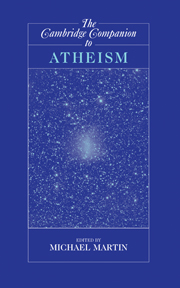1 - Atheism in Antiquity
from Part I - Background
Published online by Cambridge University Press: 28 January 2007
Summary
In 1942 the French historian Louis Febvre published his epoch-making study of Rabelais, in which he noted the absence of atheism in the Middle Ages. Febvre explained this absence as a kind of blocage mental. In the life of society and the individual, Christianity was of overriding importance. Its festivals constituted the rhythm of the year; important transitions in the life of the individual - birth, marriage, and death - were completely integrated into religious life, as were everyday activities. Churches, whose bells would always remind the forgetful believer of their existence, often dominated the landscape. It was simply impossible to think Christianity away from medieval society.
Subsequent research has modified Febvre's findings to some extent,3 but his main findings still stand. Antiquity was not that different from the Middle Ages in this respect. The ancient Greeks and Romans also moved in a landscape where temples were everywhere, where gods adorned their coins, where the calendar went from religious festival to festival, and where religious rites accompanied all major transitions in life. Consequently, atheism never developed into a popular ideology with a recognizable following. All we have in antiquity is the exceptional individual who dared to voice his disbelief or bold philosophers who proposed intellectual theories about the coming into existence of the gods without, normally, putting their theories into practice or rejecting religious practice altogether. If we find atheism at all, it is usually a “soft ” atheism or the imputation of atheism to others as a means to discredit them.
- Type
- Chapter
- Information
- The Cambridge Companion to Atheism , pp. 11 - 26Publisher: Cambridge University PressPrint publication year: 2006
- 24
- Cited by

